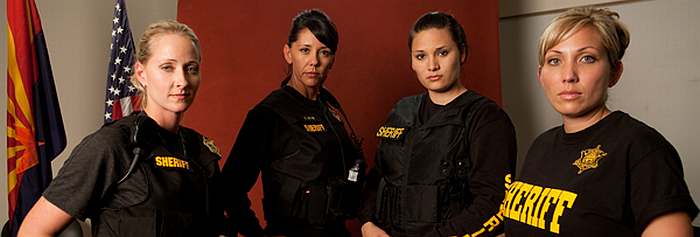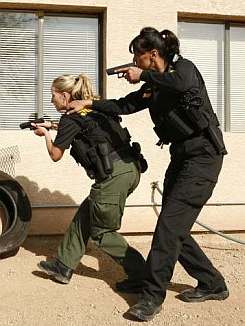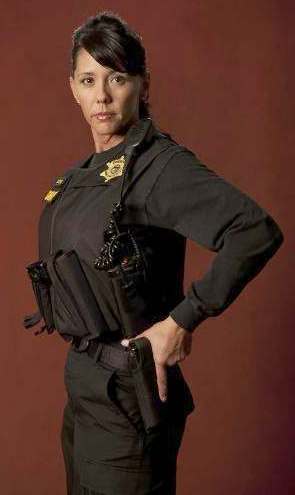 ★★★★
★★★★
“More Mums with Guns.”

 The second series of TLC’s “mommy cops” reality series struck close to home, centered as it was on Phoenix. It didn’t come as much surprise as our local sheriff, Joe Arpaio, is infamous locally as a media whore, who wastes no opportunity for self-promotion, and is a sharply-divisive figure locally, adored and loathed by about equal parts of the population. We wondered how long it would take before Joe slimed his way onto the screen: six minutes into the first episode, we had our answer. Fortunately, this was more of a blip, and our fears of an Arpaio-centered show proved largely unfounded [see the execrable Smile… You’re Under Arrest for how bad this could have been].
The second series of TLC’s “mommy cops” reality series struck close to home, centered as it was on Phoenix. It didn’t come as much surprise as our local sheriff, Joe Arpaio, is infamous locally as a media whore, who wastes no opportunity for self-promotion, and is a sharply-divisive figure locally, adored and loathed by about equal parts of the population. We wondered how long it would take before Joe slimed his way onto the screen: six minutes into the first episode, we had our answer. Fortunately, this was more of a blip, and our fears of an Arpaio-centered show proved largely unfounded [see the execrable Smile… You’re Under Arrest for how bad this could have been].
The series was an improvement on its predecessor, and not only because of the thrill of seeing local places [though we soon realized the editors played fast and loose with geography, consecutive shots often being miles apart]. The Florida show was actually quite depressing in many ways; seemed like the majority of crimes were a) drug-related, and b) ethnic. Here, there’s a good deal more variety: it seems like the sheriff’s office spent as much time serving warrants to deadbeat dads as anything [this is one of Sheriff Joe’s tactics to pad his crime numbers and make him look good, because those are piss-easy warrants to serve, compared to those involving real criminals. Again, see S…YUA]
 As notable as what is shown, is what was not included. The MCSO are notorious for “crime sweeps,” which are much about illegal immigration, a massive hot-button political issue in Arizona, as any other offense. However, these have come in for criticism from civil liberties groups, and there was not a mention of these high-profile activities on the show. The only real coverage of the topic was in chasing down “coyotes”, those who smuggle illegals across the border. On the other hand, whiny, liberal media outlets such as the Phoenix New Times bleat “Can’t The Tourism Board Shut This Show Down?” Actually, I like the New Times in general, and we’re good friends with one of their reporters, but the paper’s politics are a different issue entirely.
As notable as what is shown, is what was not included. The MCSO are notorious for “crime sweeps,” which are much about illegal immigration, a massive hot-button political issue in Arizona, as any other offense. However, these have come in for criticism from civil liberties groups, and there was not a mention of these high-profile activities on the show. The only real coverage of the topic was in chasing down “coyotes”, those who smuggle illegals across the border. On the other hand, whiny, liberal media outlets such as the Phoenix New Times bleat “Can’t The Tourism Board Shut This Show Down?” Actually, I like the New Times in general, and we’re good friends with one of their reporters, but the paper’s politics are a different issue entirely.
But outside of the the “Ooh! Been there!” local interest, I think the characters here were generally a slightly more personable bunch. As before, it centres on four women – again, mostly single moms, which makes me wonder whether the job attracts them, or leads to marital stress. There’s Deputy Amie Duong, who is the “Shelunda” of the series – when you see her arrive, you know a domestic dispute isn’t far behind. There’s Deputy Kelly Bocardo, the token minority representative, whose three brothers (among her 14 siblings, apparently!) also work for the department. And there’s Detective Lindsey Smith, whose accemt appears to drift, chameleon-like, depending on to whom she’s speaking.
 Finally, there’s Detective Deborah Moyer (right), who is completely marvellous, and the main reason to watch the show. A 19-year veteran, we’d be entirely happy if the show was 100% about her. While the other women occasionally seem very scripted when they are talking to the camera, that isn’t the case with Moyer: there’s a definite sense that what you see is what you get with her. While her policing style may not be “by the book” – in one episode, she basically arrests a teenage girl for failing to hug her father – her reactions are entirely natural and certainly had us nodding in approval more often than not. She just comes across as being very normal: when she encounters a young perpetrator, she tends to think about her own kids of the same age.
Finally, there’s Detective Deborah Moyer (right), who is completely marvellous, and the main reason to watch the show. A 19-year veteran, we’d be entirely happy if the show was 100% about her. While the other women occasionally seem very scripted when they are talking to the camera, that isn’t the case with Moyer: there’s a definite sense that what you see is what you get with her. While her policing style may not be “by the book” – in one episode, she basically arrests a teenage girl for failing to hug her father – her reactions are entirely natural and certainly had us nodding in approval more often than not. She just comes across as being very normal: when she encounters a young perpetrator, she tends to think about her own kids of the same age.
But all the police here are more interested in “justice” rather than the letter of the law. That’s in contrast to the Broward County show, where there was far too much entrapment going on: I don’t think the police should be involved in creating crime. It was also notable that the cops in Arizona seemed to have much more discretion. If you were respectful and polite (the New Times would no doubt say “subservient”), you stood a much better chance of getting off with a warning than if you gave them attitude. I’ll file that away for the next time I encounter law-enforcement here, though one speeding ticket in a decade hardly makes me a habitual offender. Still, if we got to meet Detective Moyer as a result, we might considar a life of crime!
What the show did best of all was make us appreciate that, behind the grandstanding, publicity-seeking nonsense of Sheriff Joe Arpaio, are a number of dedicated, hard-working officers who have a very difficult job to handle. They’re not Robocops, and so are both imperfect and fallible, but law-enforcement personnel are human, just like you and me. Being reminded of this fact is something that is never a bad thing.




